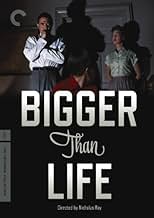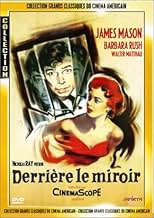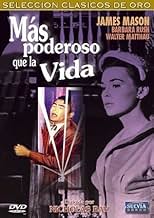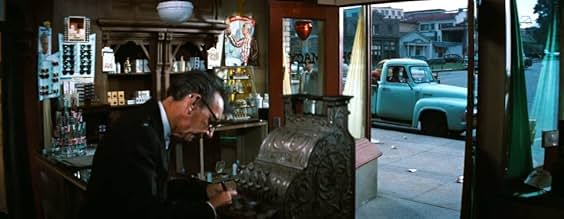IMDb RATING
7.4/10
8.7K
YOUR RATING
A seriously-ill schoolteacher becomes dependent on a miracle drug that begins to affect his sanity.A seriously-ill schoolteacher becomes dependent on a miracle drug that begins to affect his sanity.A seriously-ill schoolteacher becomes dependent on a miracle drug that begins to affect his sanity.
- Awards
- 2 nominations total
Robert F. Simon
- Dr. Norton
- (as Robert Simon)
David Bedell
- X-Ray Doctor
- (uncredited)
Gail Bonney
- Mother at PTA Meeting
- (uncredited)
Harold Bostwick
- Gentleman
- (uncredited)
Lovyss Bradley
- Churchgoer
- (uncredited)
Ann Cameron
- Churchgoer
- (uncredited)
Mary Carroll
- Mother at PTA Meeting
- (uncredited)
Virginia Carroll
- Mrs. Jones
- (uncredited)
Mary Carver
- Saleslady
- (uncredited)
7.48.7K
1
2
3
4
5
6
7
8
9
10
Featured reviews
Sincere film-making
Back in 1956 this must have been a very daring flick indeed. Of course it has dated and today it packs less of a punch but it still remains a very sincere film anchored by a superb James Mason performance. Walter Matthau is similarly top rate though in a smaller and less flashy role. The direction is absolutely mesmerizing and I only felt slightly uneasy about the psychiatric approach of the day and the flashing red screen reflecting Mason's mental disintegration which was so in fashion in films of the time.
Even so, it was not enough to spoil the pleasure afforded by the many good aspects in this movie that I found quite riveting and intelligent for the most part. The bit where Mason snips the phone cord is as frightening as it is memorable, to me the highpoint of a honest yet never predictable work.
Even so, it was not enough to spoil the pleasure afforded by the many good aspects in this movie that I found quite riveting and intelligent for the most part. The bit where Mason snips the phone cord is as frightening as it is memorable, to me the highpoint of a honest yet never predictable work.
Ignore a few stilted moments and relish some amazing acting and a curious new social problem
Bigger than Life (1956)
Tightly made, vividly acted film about a contemporary crisis--the use and abuse of a new "miracle" drug. Watching James Mason suffer, and then make other people suffer, and then face the final bells of his life, is half the movie. He's such a uniquely subtle and powerful actor (at the same time), always filled with poise and a whiff of kindly diffidence.
In a way, this is a precursor to the recent movie idea in "Limitless," where a drug makes you "bigger than life," though this is no fantasy. The drug here is cortisone, ingested orally. It had been understood as a natural (adrenal gland) steroid hormone and was manufactured (by Merck) and on the market by around 1950. And by 1956 when this movie came out it was considered a new kind of penicillin, but rather than just be an antibiotic, it seemed to just make you stronger against all kinds of ailments, especially those that involved swelling of some kind.
Director Nicholas Ray does his usual wonders with interpersonal drama and makes this quite believable, as well as dramatic, and Joe MacDonald does his usual wonders with the camera-work. The writing, too, is crisp and believable (both Ray and Mason helped with the screenplay). In all, it's a top shelf production and a great story.
But it fails somehow to be a great film, and I think the main reason is the hook to the plot, about the wonder drug, is a little too neatly packaged, with a few scenes that are almost like public service announcements. We sort of know before we are "supposed" to know that it's going to go bad--the clues go beyond foreshadowing--and so when we find out we are right, the edge is off of the narrative. Only the very end is left hanging, though you figure, with Merck keeping an eye on things, that events really can't go too wrong. According to Wikipedia, the American response at the time was shock and the movie did poorly (I guess because it looked like an attack on the nuclear family, such was the 1950s).
But the critics loved it then and like it now. A movie this well made is still a thrill to watch for all the small things--Walter Matthau in a caricatured side role as the good Uncle, the psychological effects as manifest in Mason, and even the glimpse into the attitude toward medicine at the time. I don't think it's a typical reaction to cortisone, however (from what I've read)--this is a particular case where some inherent manic-depression is triggered, and exaggerated. It would be interesting to see this re-calibrated and filmed again in modern times, but with the subtlety here, the destruction of an ordinary family without shameless excess.
Tightly made, vividly acted film about a contemporary crisis--the use and abuse of a new "miracle" drug. Watching James Mason suffer, and then make other people suffer, and then face the final bells of his life, is half the movie. He's such a uniquely subtle and powerful actor (at the same time), always filled with poise and a whiff of kindly diffidence.
In a way, this is a precursor to the recent movie idea in "Limitless," where a drug makes you "bigger than life," though this is no fantasy. The drug here is cortisone, ingested orally. It had been understood as a natural (adrenal gland) steroid hormone and was manufactured (by Merck) and on the market by around 1950. And by 1956 when this movie came out it was considered a new kind of penicillin, but rather than just be an antibiotic, it seemed to just make you stronger against all kinds of ailments, especially those that involved swelling of some kind.
Director Nicholas Ray does his usual wonders with interpersonal drama and makes this quite believable, as well as dramatic, and Joe MacDonald does his usual wonders with the camera-work. The writing, too, is crisp and believable (both Ray and Mason helped with the screenplay). In all, it's a top shelf production and a great story.
But it fails somehow to be a great film, and I think the main reason is the hook to the plot, about the wonder drug, is a little too neatly packaged, with a few scenes that are almost like public service announcements. We sort of know before we are "supposed" to know that it's going to go bad--the clues go beyond foreshadowing--and so when we find out we are right, the edge is off of the narrative. Only the very end is left hanging, though you figure, with Merck keeping an eye on things, that events really can't go too wrong. According to Wikipedia, the American response at the time was shock and the movie did poorly (I guess because it looked like an attack on the nuclear family, such was the 1950s).
But the critics loved it then and like it now. A movie this well made is still a thrill to watch for all the small things--Walter Matthau in a caricatured side role as the good Uncle, the psychological effects as manifest in Mason, and even the glimpse into the attitude toward medicine at the time. I don't think it's a typical reaction to cortisone, however (from what I've read)--this is a particular case where some inherent manic-depression is triggered, and exaggerated. It would be interesting to see this re-calibrated and filmed again in modern times, but with the subtlety here, the destruction of an ordinary family without shameless excess.
Father Knows Best
How is it that I'd never heard of this movie before?
"Bigger Than Life" is a dream come true for those movie fans (I count myself among them) who love the decade of the 1950s for its total cinematic schizophrenia. I can't think of another decade that created whole omnibuses of films more strongly opposed to one another. It seems that half of the filmmakers of the 50s were churning out earnest Technicolor pap that tried to sell the American public a version of the 50s that simply didn't exist yet which everyone so desperately wanted to believe did, while the other half were making movies about everything that was wrong with the very version of America the other half was clinging to. If you're a fan of subtext in films, and especially interested in seeing how filmmakers could work within the conventions of a genre while turning those conventions against themselves, the 50s are your decade. And for the ultimate master of subtext, look no further than Nicholas Ray.
There isn't a Ray film I've seen that isn't dripping in subtext, socio-political, sexual, gender-based, you name it. "Bigger Than Life" stars a towering James Mason as a family man who's turned into a literal monster when he becomes addicted to a drug that helps keep a life-threatening medical problem at bay. The film goes to some jaw-dropping places, especially toward the end, as Mason's character evolves from protector to worst nightmare and the picture-perfect family life depicted in the earlier parts of the film dissolve before our very eyes. However, Ray's point all along is that that picture-perfect family never really existed in the first place, and the drug on which Mason gets hooked brings out the "id" in him and the family dynamic that's been lurking there all along.
Ray was the rare director who could make the saturated Technicolor and massive Cinemascope aspect ratios of 1950s filmmaking work to his advantage and serve his artistic purposes, rather than simply be used to photograph pretty gowns and landscapes. In fact, despite its Cinemascope grandeur, "Bigger Than Life" is all about cramped interiors -- offices, bedrooms, one's own feverish mind -- and the skeletons in the closets, real and imagined, that are hiding there.
Grade: A
"Bigger Than Life" is a dream come true for those movie fans (I count myself among them) who love the decade of the 1950s for its total cinematic schizophrenia. I can't think of another decade that created whole omnibuses of films more strongly opposed to one another. It seems that half of the filmmakers of the 50s were churning out earnest Technicolor pap that tried to sell the American public a version of the 50s that simply didn't exist yet which everyone so desperately wanted to believe did, while the other half were making movies about everything that was wrong with the very version of America the other half was clinging to. If you're a fan of subtext in films, and especially interested in seeing how filmmakers could work within the conventions of a genre while turning those conventions against themselves, the 50s are your decade. And for the ultimate master of subtext, look no further than Nicholas Ray.
There isn't a Ray film I've seen that isn't dripping in subtext, socio-political, sexual, gender-based, you name it. "Bigger Than Life" stars a towering James Mason as a family man who's turned into a literal monster when he becomes addicted to a drug that helps keep a life-threatening medical problem at bay. The film goes to some jaw-dropping places, especially toward the end, as Mason's character evolves from protector to worst nightmare and the picture-perfect family life depicted in the earlier parts of the film dissolve before our very eyes. However, Ray's point all along is that that picture-perfect family never really existed in the first place, and the drug on which Mason gets hooked brings out the "id" in him and the family dynamic that's been lurking there all along.
Ray was the rare director who could make the saturated Technicolor and massive Cinemascope aspect ratios of 1950s filmmaking work to his advantage and serve his artistic purposes, rather than simply be used to photograph pretty gowns and landscapes. In fact, despite its Cinemascope grandeur, "Bigger Than Life" is all about cramped interiors -- offices, bedrooms, one's own feverish mind -- and the skeletons in the closets, real and imagined, that are hiding there.
Grade: A
prescient subject matter
Ed Avery (James Mason) is a school teacher with loving wife Lou (Barbara Rush) and son Richie. Pat Wade and Wally Gibbs (Walter Matthau) are his friends fellow teachers. He starts blacking out from terrible pains. Hospital doctors diagnose him with a rare disease and give him experimental cortisone treatment. He makes a remarkable recovery and given cortisone tablets to take. His personality starts to change and he begins to abuse the pills.
The subject matter of prescription drug abuse is prescient although the madness is sometimes reminiscent of the old educational films of the dangers of marijuana. The 50's nuclear family does keep this mired in an old fashion style. Nevertheless, it is very admirable to see this issue tackled. The widescreen CinemaScope does something interesting to the interior scenes. When the walls on both sides of the room can be seen, it pulls the audience inside the rooms. The characters and their story becomes even more immediate.
The subject matter of prescription drug abuse is prescient although the madness is sometimes reminiscent of the old educational films of the dangers of marijuana. The 50's nuclear family does keep this mired in an old fashion style. Nevertheless, it is very admirable to see this issue tackled. The widescreen CinemaScope does something interesting to the interior scenes. When the walls on both sides of the room can be seen, it pulls the audience inside the rooms. The characters and their story becomes even more immediate.
Ten Feet Tall
"We are dabbling in the unknown with dangerously potent tools." That is from the magazine article on which this film is based: "Ten Feet Tall," by Berton Roueché, from his brilliant "Annals of Medicine" series in The New Yorker (10 September 1955). Before I watched this Nicholas Ray film for the 2nd time, I read the original article and was quite astonished to find that the film is both faithful and unfaithful to the truth, and in surprising ways.
The most stunning thing is how quickly Ed (James Mason) is affected by the cortisone he is given to treat his rare and dire disease, a typically fatal inflammation of the arteries. I doubted that the derangement that made him feel "ten feet tall" would have happened as quickly as in the movie, which needs to get the plot going.
Well, I was wrong. The Long Island teacher on whom the article was based had a psychotic break almost as soon as he started taking the corticosteroid. The entire episode of his psychosis lasted only three weeks, but during that time, he was a terrifying presence. His threatening, dictatorial behavior toward his wife and son, not to mention his colleagues, were, yes, exaggerated for dramatic effect (especially the scorn he heaps on his wife), but Mason's portrayal is strikingly close to the real teacher's experience: the madly impulsive spending, the manic speeches and wild philosophical brainstorms, as well as his demand to be absolute ruler in his home and his unveiled contempt for everyone because they're all fools, except him.
James Mason, Barbara Rush, and Walter Matthau do solid work, as does Christopher Olsen, a child actor who also worked with Hitchcock, Cukor, and Sirk. Much has been said about Nicholas Ray's choices as director, and what interests me most is the ways he chose to be unfaithful to the original story.
First, location. Although the actual teacher lived in Forest Hills in Queens, "Bigger than Life" is set in a nameless suburbia, and it was filmed it in color for the big screen even though it's a domestic drama of the sort that was still shot in black-and-white at the time. Much has been made of those two choices, which are taken to be a commentary on stifling, conformist suburban lives in the 1950s. But I think Ray's decision to move it to a more typical American landscape than New York City, and to treat it as a big-screen color feature, had to do with the dramatic weight of the subject: drugs that save lives can cripple them at the same time, and the film has strong references to the deep shame that was (and to some extent still is) attached to mental illness. The wife won't even hear the word psychiatrist.
Second, the doctors. In the movie, Ed tricks doctors and druggists to increase his intake of cortisone-- if he feels ten feet tall on one pill, why not take two? In the true story, it was the doctor who increased the dosage, but did not schedule frequent follow-ups, even though he knew the risks from side effects. That's a much more damning situation than a mentally ill outpatient doubling his own dosage. So why shift the blame from doctor to patient in the movie? Here's a possibility: There was concern about blowback from pharmaceutical companies and/or the American Medical Association. But on the whole, I can see why "Bigger Than Life" has come to be so highly regarded, if not sufficiently well known.
The most stunning thing is how quickly Ed (James Mason) is affected by the cortisone he is given to treat his rare and dire disease, a typically fatal inflammation of the arteries. I doubted that the derangement that made him feel "ten feet tall" would have happened as quickly as in the movie, which needs to get the plot going.
Well, I was wrong. The Long Island teacher on whom the article was based had a psychotic break almost as soon as he started taking the corticosteroid. The entire episode of his psychosis lasted only three weeks, but during that time, he was a terrifying presence. His threatening, dictatorial behavior toward his wife and son, not to mention his colleagues, were, yes, exaggerated for dramatic effect (especially the scorn he heaps on his wife), but Mason's portrayal is strikingly close to the real teacher's experience: the madly impulsive spending, the manic speeches and wild philosophical brainstorms, as well as his demand to be absolute ruler in his home and his unveiled contempt for everyone because they're all fools, except him.
James Mason, Barbara Rush, and Walter Matthau do solid work, as does Christopher Olsen, a child actor who also worked with Hitchcock, Cukor, and Sirk. Much has been said about Nicholas Ray's choices as director, and what interests me most is the ways he chose to be unfaithful to the original story.
First, location. Although the actual teacher lived in Forest Hills in Queens, "Bigger than Life" is set in a nameless suburbia, and it was filmed it in color for the big screen even though it's a domestic drama of the sort that was still shot in black-and-white at the time. Much has been made of those two choices, which are taken to be a commentary on stifling, conformist suburban lives in the 1950s. But I think Ray's decision to move it to a more typical American landscape than New York City, and to treat it as a big-screen color feature, had to do with the dramatic weight of the subject: drugs that save lives can cripple them at the same time, and the film has strong references to the deep shame that was (and to some extent still is) attached to mental illness. The wife won't even hear the word psychiatrist.
Second, the doctors. In the movie, Ed tricks doctors and druggists to increase his intake of cortisone-- if he feels ten feet tall on one pill, why not take two? In the true story, it was the doctor who increased the dosage, but did not schedule frequent follow-ups, even though he knew the risks from side effects. That's a much more damning situation than a mentally ill outpatient doubling his own dosage. So why shift the blame from doctor to patient in the movie? Here's a possibility: There was concern about blowback from pharmaceutical companies and/or the American Medical Association. But on the whole, I can see why "Bigger Than Life" has come to be so highly regarded, if not sufficiently well known.
Did you know
- TriviaThe main manufacturers of cortisone at the time, Merck in the US and Glaxo in the UK, were worried about the impact of this film on the public and their willingness to take the drug if prescribed by their physician. However, by the time of this film's release, newer and better formulations of the drug, along with greater knowledge of its uses and limitations had reduced (but not eliminated) the side-effects experienced by Ed in this film.
- GoofsWhen Ed has a barium X-ray, the image of the swallowed fluid is anatomically inaccurate. The fluid falls straight down to an extremely large "stomach" in his groin area.
- How long is Bigger Than Life?Powered by Alexa
Details
- Release date
- Country of origin
- Languages
- Also known as
- One in a Million
- Filming locations
- Production company
- See more company credits at IMDbPro
Box office
- Budget
- $1,000,000 (estimated)
- Runtime
- 1h 35m(95 min)
- Color
- Aspect ratio
- 2.55 : 1
Contribute to this page
Suggest an edit or add missing content


































